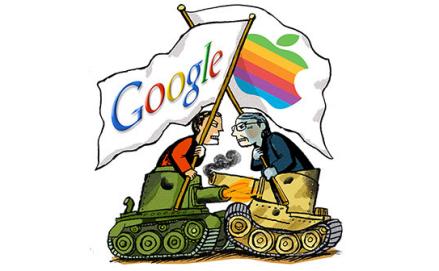
Illustration by Robert Neubecker
Reminder: Matt Yglesias and Farhad Manjoo are wargaming a fanciful, definitely-not-actually-true version of what might happen if Google and Apple went to war. You can see how the battle began here.
As of Nov. 8, 2013, Google has:
Cash on hand: $50 billion
Personnel: 45,000
Territory controlled: Office buildings, server farms, the political sympathies of the Republican Party in the United States, and the governments of India, Mexico, Brazil, and all of South America.
Larry Page is in his solar when he learns about the attacks. He?s spent the better part of the day trying to download The Art of War but the stupid Wi-Fi router seems to be crapping out again. That?s when the red phone rings. It?s just one ring, though. One ring is OK, only a power outage. Those happen once a year.
Then it rings again. Two rings. Two rings has only happened once before. Two rings means one of the datacenter watchtowers has been taken out. But that?s not terrible. There are other watchtowers. There are electrified fences and armed guards and a brutal logic puzzle-based lock, too.
Then the red phone rings once more. Three rings. Three rings means the servers have been hit, that data has been lost. Three rings has never happened. Three rings is never supposed to happen.
Page picks up the red phone. Joe Kava, Google?s data center chief, is ready with a plan. ?Don?t worry,? he tells Page. The destroyed site in Oregon was the company?s only datacenter in a hostile blue state. Kava has heard from the governors of Iowa, Georgia, Oklahoma, and North and South Carolina, where Google?s five remaining American datacenters are located. The Republicans can?t stomach Apple?s lawlessness, and they move to dispatch National Guard troops to protect Google?s servers.
But Kava also has a backup in case the governors don?t come through, and for use in hostile regions across the globe. ?We?ve gone mobile,? he says. Since 2006, when Google began building its own data centers, it has been preparing for just this sort of disaster (and every other sort, including zombies and aliens). In 2008 Google was awarded a patent for modular, portable, shipping-container based server racks?picture them as huge, pre-fab Lego blocks of servers that can be moved and snapped into the grid to be restarted once more. Even its data centers? heating and cooling systems are modular and portable. Only Page and a few others at Google know where these huge rigs are constructed, so the manufacturing sites are safe from attack. Page authorizes Kava to spend whatever he needs in order to keep cranking out enough server containers. They?ll be placed anywhere and everywhere Google can find access to the grid?in friendly states across the U.S., in South American slums, in Asian high-rises, sometimes with the cooperation of locals and other times completely discreetly. Google has always had more server space than it needed, and now it will have even more, even more widely distributed. ?Don?t worry about the data,? Kava tells Page before he hangs up. ?The data is everywhere.?
But that?s little consolation. Page closes his eyes. He pictures all the precious data at the Oregon center going up in smoke. He feels violated. Apple doesn?t realize what it?s done. No one goes after Larry Page?s data and gets away with it.
The short-term plan is straightforward. Page knows that Apple has a single central point of failure: All of its mobile devices run on processors manufactured by Samsung, which is also Apple?s fiercest competitor in the mobile device business. Apple has been trying to find other chip providers for years, but that plan has been delayed by technical snafus. Meanwhile Samsung has every reason to side with Google?the Korean company?s mobile devices run on Android. Page texts Samsung CEO Kwon Oh Hyun with a blunt ultimatum: ?Stop selling to apple or we cut u off from android.? The next day, Samsung announces that it will no longer make processors for Apple. The iPhone will have no brain.?
And if Apple wants a ground war, Page will be happy to indulge. But he won?t use bulldozers to do it. Apple makes most of its devices using CNC lathes, which etch slabs of aluminum into the parts for iPhones, iPads, and Macs. These lathes run on software. And who understands software better than Google engineers? Page calls up half a dozen of his best coders. They?re shuttled to the GooglePlex immediately, where they write a virus that can infect Apple?s CNC lathes. All of Apple?s production occurs in a handful of factory towns in China. When the virus is ready, Google?s on-the-ground teams?disguised as StreetView car drivers?smuggle the code into Apple?s factories. It?s no more difficult than it was for the Israelis to use USB sticks to plant Stuxnet in Iran?s nuclear facilities. On Nov. 8, Page issues the order and the virus is activated. In each factory, the lathes perform one final job and then overheat themselves and shut down forever. A single sheet of aluminum rolls off the assembly line, Google?s logo etched into its face.
ricin Google Fiber Boston Strong Dzhokhar A. Tsarnaev Boston Bombing Suspect fbi Watertown Ma
Hello Friends Hope u Guyz are looking For online Fun place especially Pakistani chatroom and People English Hindi German Chinese Speaking Urdu Sindhi Pashto Balochi Punjabi Kashmiri Siraeki and that is why GupshupFamily is best for Bringing everyone Together. So Follow the link www.GupshupFamily.com and Join ONLINE FREE PAKISTANI Chat Room Without Registration It's Totally Free Of Sign up u can easily sign up and chat there meet new people and make new Friends so what u waiting for hurry up and join our Pakistani Free Chat Room Without Registration. FREE ONLINE PAKISTANI CHAT ROOM WITHOUT REGISTRATION
ReplyDelete